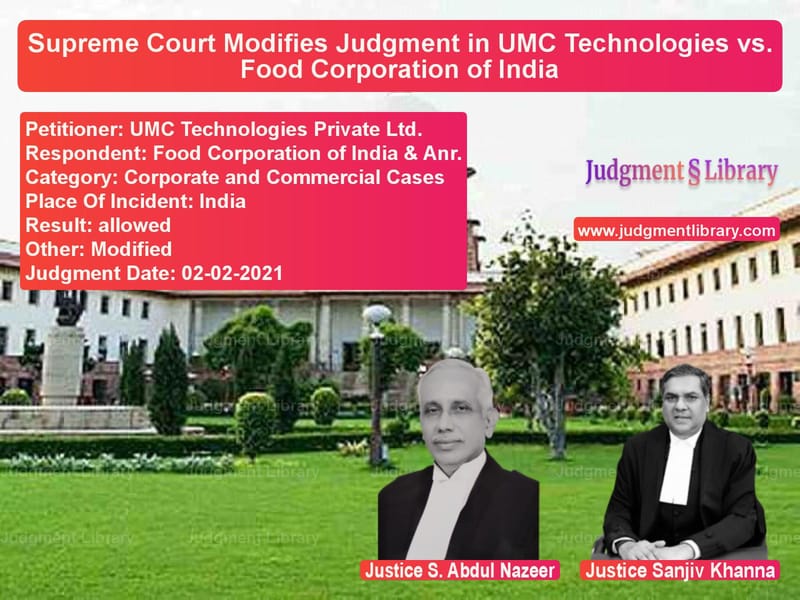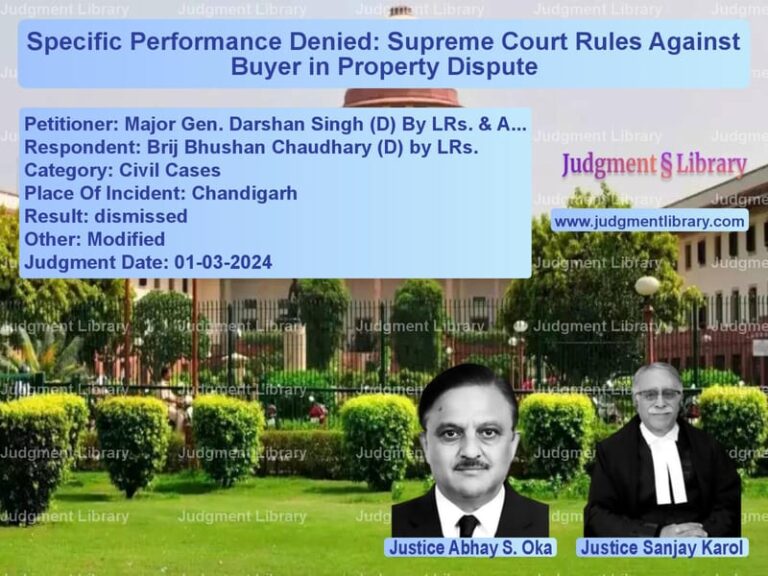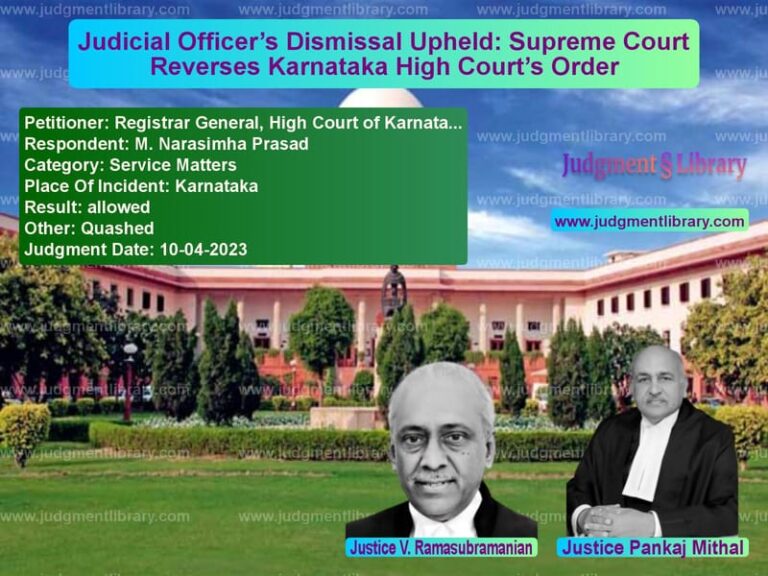Supreme Court Modifies Judgment in UMC Technologies vs. Food Corporation of India
The Supreme Court of India recently ruled on a miscellaneous application filed by UMC Technologies Private Ltd. in the case of UMC Technologies Private Ltd. vs. Food Corporation of India & Anr.. The Court allowed the application, modifying a portion of its previous judgment dated November 16, 2020. This ruling highlights the Court’s power to review and modify its orders when necessary while upholding the principles of fairness and justice.
The judgment, delivered by a bench comprising S. Abdul Nazeer and Sanjiv Khanna, directed that the words “including an employee of the appellant” be deleted from paragraph 4 of the previous order. However, the rest of the judgment remained unchanged.
Background of the Case
Dispute Between UMC Technologies and Food Corporation of India
The case arose from a contractual dispute between UMC Technologies Private Ltd. and the Food Corporation of India (FCI). The dispute involved allegations of irregularities in contract execution, leading to litigation. The Supreme Court had previously adjudicated the matter in its November 16, 2020 judgment.
Grounds for Modification
After the judgment was delivered, UMC Technologies filed a miscellaneous application under the Civil Appellate Jurisdiction, seeking a minor modification in paragraph 4 of the judgment. The appellant argued that the inclusion of the phrase “including an employee of the appellant” could have unintended legal consequences affecting employees of UMC Technologies.
Petitioner’s Arguments
- The appellant contended that the reference to employees in paragraph 4 was unnecessary and could be misinterpreted.
- The phrase “including an employee of the appellant” was broad and could create confusion in the implementation of the judgment.
- The modification sought was minimal and would not alter the core reasoning or findings of the Court.
Respondent’s Arguments
- The Food Corporation of India opposed the modification, arguing that judicial orders should not be altered unless a significant legal error is demonstrated.
- The respondents asserted that the judgment should be read as a whole and that the disputed phrase did not impact the overall ruling.
- They emphasized the importance of finality in Supreme Court decisions.
Supreme Court’s Observations and Ruling
Power of the Supreme Court to Modify Orders
The Supreme Court examined whether it had the authority to modify an already pronounced judgment. The bench held:
“While judicial discipline requires orders to attain finality, courts must ensure that inadvertent errors or ambiguous wording do not lead to unintended consequences.”
Scope of the Modification
The Court clarified that the modification would not change the substantive outcome of the case but was necessary to prevent any unintended interpretations. It ruled:
“The words ‘including an employee of the appellant’ stand deleted from paragraph 4 of the judgment dated 16.11.2020. Rest of the order to remain as it is.”
Final Judgment
- The Supreme Court allowed the modification requested by UMC Technologies Private Ltd.
- The phrase “including an employee of the appellant” was deleted from paragraph 4 of the previous judgment.
- The rest of the judgment remained unchanged.
- Pending applications, if any, were disposed of.
Key Takeaways from the Judgment
- Judicial orders can be modified to correct unintended errors or prevent ambiguity.
- Finality of judgments is essential, but courts retain the power to make minor adjustments when warranted.
- Ambiguous wording in judgments can have unintended legal consequences, necessitating judicial review.
- Minor modifications do not alter the core legal reasoning of a judgment but serve to refine its clarity.
- The Supreme Court ensures justice by addressing concerns raised through valid legal channels.
Impact of the Judgment
This ruling reaffirms that while judicial pronouncements must attain finality, courts must remain open to addressing minor ambiguities or errors that could create unintended consequences. It highlights the importance of clarity in judicial language and ensures that litigants are not unduly affected by unintended interpretations of legal text.
Conclusion
The Supreme Court’s ruling in UMC Technologies Private Ltd. vs. Food Corporation of India & Anr. exemplifies the balance between judicial finality and the need for accuracy in legal pronouncements. By allowing the deletion of an ambiguous phrase, the Court has demonstrated its commitment to ensuring that judgments are clear, unambiguous, and just.
Petitioner Name: UMC Technologies Private Ltd..Respondent Name: Food Corporation of India & Anr..Judgment By: Justice S. Abdul Nazeer, Justice Sanjiv Khanna.Place Of Incident: India.Judgment Date: 02-02-2021.
Don’t miss out on the full details! Download the complete judgment in PDF format below and gain valuable insights instantly!
Download Judgment: umc-technologies-pri-vs-food-corporation-of-supreme-court-of-india-judgment-dated-02-02-2021.pdf
Directly Download Judgment: Directly download this Judgment
See all petitions in Contract Disputes
See all petitions in Corporate Compliance
See all petitions in Judgment by S. Abdul Nazeer
See all petitions in Judgment by Sanjiv Khanna
See all petitions in allowed
See all petitions in Modified
See all petitions in supreme court of India judgments February 2021
See all petitions in 2021 judgments
See all posts in Corporate and Commercial Cases Category
See all allowed petitions in Corporate and Commercial Cases Category
See all Dismissed petitions in Corporate and Commercial Cases Category
See all partially allowed petitions in Corporate and Commercial Cases Category







